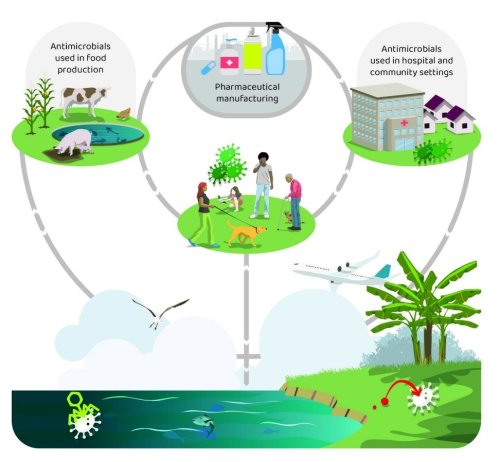
This course is also offered in Spanish. For more information, click here. (Este curso también se ofrece en español. Para más información, haz clic aquí.)
Next Dates: October 01, 2024 - December 10, 2024
Duration: 10 weeks
Registration: CLOSED
Format: online, blended learning (Moodle, Zoom)
Target Group: professionals, students, and educators
Host: LMU Munich, Germany
About the Course
Antibiotic resistance is a global health threat because infections caused by resistant bacteria in humans and animals become difficult to treat with the available antibiotics. Thus, antibiotic resistance is considered a One Health problem that affects the lives of humans, animals, and the environment. This phenomenon originates from the ability of bacteria and their genes to spread reciprocally between species. However, the overuse of antibiotics in human and veterinary medicine and agriculture can significantly increase the spread and persistence of antibiotic resistance in various ecosystems.
For instance, antibiotic-resistant bacteria and their genes have been found in vital water ecosystems, such as lakes, oceans and rivers. These problematic findings can be attributed to discharges from aquaculture and other types of agricultural practices, pharmaceutical industries, and waste from cities and hospitals, presenting global implications for marine wildlife and humans.
This course links two priority topics, antibiotic resistance and marine conservation, under the One Health approach, as they are interconnected and have widespread implications for human, animal, and environmental health.

Content and Requirements
The course Antibiotic Resistance and Marine Conservation consists of a blended learning system that includes synchronous and asynchronous sessions.
The content used in asynchronous sessions is presented on the Moodle platform, where participants explore the theoretical basis of the emergence of antibiotic-resistant bacteria and the pathways of spread between humans, animals, and the environment. Students are introduced to recent scientific studies related to the One Health approach showing the link between marine life and antibiotic resistance, and explore the impact of antibiotic resistance on marine life. Finally, interactive materials and sessions allow participants to explore various research methods that can be used to investigate One Health issues.
During synchronous sessions, participants meet online via Zoom with guest speakers and work in international and interdisciplinary teams on a study protocol focused on One Health topics.
Learning Objectives
By the end of the module, participants are expected to:
- identify the definition, causes and routes of the spread of antibiotic resistance bacteria;
- recognize antibiotic resistance as a One Health topic;
- identify the various factors that impact marine life and their effect on human, animal and environmental health;
- explore the interconnections between marine life and antibiotics;
- explore different research methods applicable to One Health topics.
Target Group
The course is designed for professionals, students, and docents of Masters/PhD or equivalent programs (e.g. completed preliminary examination) in disciplines such as:
- Human Health (human medicine, nursing, public health, epidemiology);
- Animal Health (veterinary medicine, agricultural studies);
- Environmental Studies (ecology, wildlife studies, sustainability), and
- Social Studies (anthropology, economics, geography, sociology).
Learning Concept
Online, blended learning with synchronous and asynchronous sessions, using Moodle and Zoom plaforms.
Duration, Credits, Schedule and Dates
The module lasts 10 weeks, and is designed for 90 working hours, including 30h working with online material and meetings and around 60h of self-study and project work.
The course offers 3 ECTS (needs to be approved by the student's home institution) and will be offered from October 01, 2024 to December 10, 2024.
Language
The Antibiotics Resistance & Marine Conservation: A One Health Approach course is offered in English.
For more information about the Spanish course, Resistencia a Los Antibióticos y Conservación de Los Océanos: Un Enfoque de Una Salud, click here.
Registration
Registration is now closed.
Contact
For more information, please contact osh-munich@lrz.uni-muenchen.de

